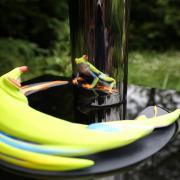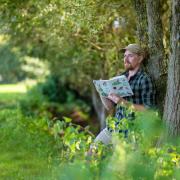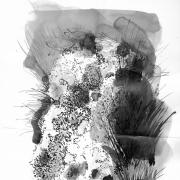Rural Tuscany provides the setting for the latest offering by novelist Amanda Craig. The Three Graces is a thought-provoking, five-star ride with plenty to appeal to all generations.
Amanda’s home overlooks west Dartmoor. I’d visited her there before - on the publication of her Devon-set novel The Lie of The Land. From there, to her new book based in Tuscany, might seem a stretch but and she feels that the hills and waterside scenery remind her of Tuscany and Lake Trasimeno, and vice versa. And this adventure all begins with a shooting in the dead of night.
This is so typical of Amanda. Things are never quite what they seem. She deftly removes rose-tinted filters, shines a light in dark places and, as with her other novels, she plays her cards brilliantly.

Woven into a suspenseful narrative is a running commentary on where we are in the world, socially, economically, politically, and how this colours and influences everyone’s lives. It’s an aspect of her style of contemporary fiction that I find particularly appealing. The characters are placed in context, and as the pages turn and the plot develops, we truly understand why they act as they do. Hence the aforementioned attempt to defend property against a perceived threat from an intruder – who turns out to be an illegal migrant in flight from people traffickers as he travels from Africa to Italy.
Amanda is a novelist, short-story writer and critic. Born in South Africa, she grew up in Italy, where her parents worked for the UN, and was educated at Bedales School and Clare College Cambridge. She became a journalist for newspapers such as The Sunday Times, The Observer, The Daily Telegraph and The Independent, winning both the Young Journalist of the Year and the Catherine Pakenham Award.
Writers invariably draw on past experience and, in our conversation, Amanda explains how her life has shaped her work. ‘My mother and father lived in Italy. I watched them ageing and become visibly different, and yet remain so much themselves. They retired to a Tuscan town, Cortona, which is both very rural and yet immersed in a sophisticated culture since Etruscan and Roman days.’
Very early on, with reference to three of the main ex-pat protagonists, Ruth, Marta and Diana, Amanda writes, ‘Age had not diminished them: quite the opposite. They had become more concentrated versions of themselves, just as a pot of soup does the longer it is simmered.’ These powerful, older women link to the title of the book and of course it is a version of Botticelli’s Three Graces we see on the cover.

It’s against this background, and the upcoming wedding of Ruth’s grandson, Olly, that a story combining social comedy, romance and suspense unfolds.
Along with her friends, (regular readers of Amanda’s books will recognise the characters such as Diana and her husband Lord Evenlode from The Golden Rule), Ruth struggles to make sense of many of the younger guests and how they earn a living. This magnifies a generational chasm. To be age 50 plus and thrust into the company of Tania, a social media influencer and her vlogging, creates a sometimes highly amusing scenario - if not conflict! Tania is sharing her commercially subsidised marriage to Olly with the world via absurd hashtags such as #cottagecore to convey to followers that the marital theme is ‘simple and rustic’. Which to older onlookers is nothing short of perplexing.
Her hair, at a metre long, makes Tania perfect as a brand ambassador for a leading shampoo manufacturer. She engineers a trip to pose and film in front of The Birth of Venus in Florence’s Uffizzi Gallery. Priceless! But there is a twist. Tania is much more than her hair, and like every character is hiding a secret. She works her tresses. Amanda adds, ‘I wanted to explore the gulf, and often acrimonious rift, between boomers and Gen Z. All sides have a point.’
Amanda tackles difficult subjects – bringing migration into the mix. ‘Italy is on the front line because of the proximity to Africa.’ There is a huge paradox. How can innate Italian warmth and kindness co-exist with the negativity of racism? What I feel readers will gain, apart from a five-star ride, is a thought-provoking snapshot of the times in which we live. It’s a series of contrasts, many of which are worthy of discussion.
Ruth, a former psychotherapist, has made a haven out of 20 hectares at her farm, La Rosa. She’s had help in the form of WWOOFers, the volunteers attached to the World Wide Organisation of Organic Farms. Diana is nursing her husband, who is living with dementia, and reflects on their long and troubled union. Whilst Marta, a survivor of the Fall of Berlin faces her own demons yet continues to give piano recitals. What cements the bond between is the depth of friendship. They’ve reached a time in their lives when old friends are most valued. I found a lot of Amanda’s writing very moving.

Whenever I’ve discussed her books over coffee or in a literary group, it’s fascinating to observe what each person takes away. It can be enhancing in terms of knowledge or offer emotional enrichment. I feel certain, that across age ranges, everyone will identify or empathise with one character or another. And that’s the mark of a great writer.
The Three Graces is published by Abacus, £18.99
amandacraig.com




























